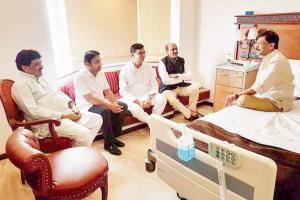Polls no longer seem to matter as much as action behind the scenes because politicians have no qualms about leaving voters in the dark

Congress leaders (extreme left) Ashok Chavan, (3rd from left) Balasaheb Thorat, (4th from left) Manikrao Thakare, and others visit Shiv Sena leader Sanjay Raut (right) at Lilavati Hospital in Mumbai. File pic
 This column may or may not be published in a Maharashtra that has a new Chief Minister. In an ideal world, there should be one, because so many men — it does seem as if India has reconciled itself to being a country driven by the male of the species alone — applied for the position and there were rumours of some party or another winning the election.
This column may or may not be published in a Maharashtra that has a new Chief Minister. In an ideal world, there should be one, because so many men — it does seem as if India has reconciled itself to being a country driven by the male of the species alone — applied for the position and there were rumours of some party or another winning the election.
ADVERTISEMENT
I don't take elections as seriously as I once did, and suspect millions of my fellow Bombayites share that sentiment if voter apathy is to be believed. No one bothers to ask why we feel this way though, even though the answer plays itself out in public after every major election. I struggle to keep track of who these politicians are and what they represent because they start the year with one party and often end up in a completelydifferent one.
It's obvious that things like values, belief systems and manifestos can never match the desperate need for power, which explains why voters have to sit back impotently and twiddle their thumbs as deals are made in the dark.
What happens during these meetings anyway? I think about them a lot because unlike the corporate get-togethers so many of us have access to in our daily lives, few of us ever get a seat at tables where entire states are being carved up and served.
I wonder about how these meetings are set up, or how the agenda is agreed upon. Do attending ministers share their CVs and put forth arguments for why they should be given particular portfolios? Do any of them even have CVs?
Another thing I often wonder about is reports of ministers spirited away to five-star resorts before or after elections to prevent them from defecting. These are adults: grown men who must be locked away in gilded cages to prevent other parties from stealing them away.
It boggles the mind that this can happen because it points to just how fickle our leaders really are, and how their so-called political beliefs are little more than posturing for the television cameras.
Maybe we should move away from elections to something resembling a reality TV show, where politicians are pitted against each other in public. Maybe they should openly barter portfolios and seats, districts and constituencies, or accomplish a set of tasks to win specific berths in Parliament.
Doing this won't be as difficult for them as one imagines, given how acting skills are now mandatory for anyone to be taken seriously by the bored Indian voter. Years of entertainment channels masquerading as news outlets have created leaders who can now switch themselves on and off depending upon when the cameras start rolling.
I could be overreacting, of course. Political deals have been struck behind the backs of voters for as long as elections have existed. It sometimes feels as if we accept this simply because we have been trained to accept it as inevitable though.
We vote for a politician or party based on promises made, then accept a complete rejection of that mandate the minute a politician switches sides for a party that brings a more lucrative offer. We accept this sort of casual betrayal because we have such low expectations of the people we elect that their lack of principles can only be shrugged off.
Here's another thing I find interesting — how merit never comes into play when it comes to deciding who should or shouldn't be put in charge of managing a state.
Sometimes, it's a candidate who has no understanding of what the financial capital's specific needs are; at other times, it's a candidate who has been recommended simply because he happens to be related to someone who once called the shots.
We also have candidates who have never been in charge of anything larger than a football team in their lives, but who still want us to support their bid because that's how politics works in our country.
We may have a new chief minister. Or maybe we won't. Maybe we will get ministers working in shifts, who will move in and out of office depending on a deal that has been struck far away from our prying eyes. It won't really matter though, because the presence or absence of this minister won't change the fact that our city will continue to crumble. If the past 50 ministers have taught us something, it is only that we have no one to rely on but ourselves.
When he isn't ranting about all things Mumbai, Lindsay Pereira can be almost sweet. He tweets @lindsaypereira
Send your feedback to mailbag@mid-day.com
The views expressed in this column are the individual's and don't represent those of the paper
Catch up on all the latest Mumbai news, crime news, current affairs, and also a complete guide on Mumbai from food to things to do and events across the city here. Also download the new mid-day Android and iOS apps to get latest updates
 Subscribe today by clicking the link and stay updated with the latest news!" Click here!
Subscribe today by clicking the link and stay updated with the latest news!" Click here!






